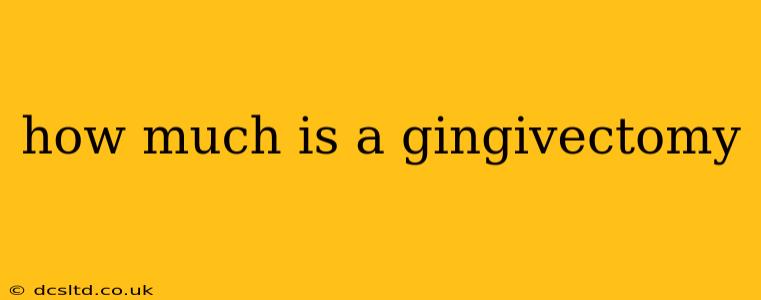How Much is a Gingivectomy? Understanding the Costs of Gum Surgery
A gingivectomy, a surgical procedure to remove excess gum tissue, is a common periodontal treatment. The cost, however, is highly variable and depends on several factors. There's no single answer to "how much is a gingivectomy?", as the price can range significantly. This article will break down the factors influencing the cost and provide you with a better understanding of what to expect.
What factors affect the cost of a gingivectomy?
Several key factors influence the final cost of a gingivectomy:
-
Extent of the procedure: A smaller, localized gingivectomy will naturally cost less than a more extensive procedure involving multiple teeth or areas of the gums. The complexity of the surgery directly impacts the time and resources required.
-
Geographic location: The cost of living and healthcare expenses vary significantly across geographical locations. A gingivectomy in a high-cost area like New York City will likely be more expensive than in a rural area.
-
Dentist's experience and expertise: Experienced periodontists (gum specialists) often charge more than general dentists due to their advanced training and expertise. Choosing a specialist often leads to better outcomes, but also a higher price tag.
-
Anesthesia: The type of anesthesia used will affect the overall cost. Local anesthesia is typically less expensive than sedation or general anesthesia. The need for sedation or general anesthesia will depend on the extent and complexity of the procedure as well as patient comfort levels.
-
Additional procedures: If the gingivectomy is performed alongside other procedures, such as bone grafting or scaling and root planing, the total cost will increase. Often, these procedures are necessary to address underlying issues contributing to gum recession or disease.
What is included in the cost of a gingivectomy?
The total cost typically includes:
-
Consultation fees: The initial consultation with the dentist or periodontist to assess your needs and discuss the procedure.
-
Surgical fees: The cost of the gingivectomy surgery itself, including the surgeon's time, the surgical instruments and materials.
-
Anesthesia fees: As mentioned earlier, the cost of anesthesia, if needed.
-
Post-operative care: This includes follow-up appointments to monitor healing and address any potential complications.
What are the payment options for a gingivectomy?
Most dental practices offer various payment options to make the procedure more accessible. These typically include:
-
Cash payments: Often resulting in a slight discount.
-
Credit cards: Major credit cards are generally accepted.
-
Dental insurance: Many dental insurance plans cover at least a portion of the cost of periodontal procedures like gingivectomies, though the coverage varies widely depending on the specific plan. It's crucial to check your policy details before scheduling the procedure.
-
Financing plans: Some dental offices offer in-house financing plans or work with third-party financing companies to spread the cost of the procedure over several months or years.
How can I find out the exact cost for my gingivectomy?
The only way to determine the precise cost of your gingivectomy is to schedule a consultation with a dentist or periodontist. During this consultation, they will examine your gums, discuss your medical history, and develop a treatment plan. They will then provide you with a detailed cost estimate, outlining all associated fees.
Are there less expensive alternatives to a gingivectomy?
In some cases, less invasive treatments might address the underlying issues, potentially reducing the need for a gingivectomy or minimizing its extent. It's essential to discuss all treatment options with your dentist or periodontist to determine the most appropriate and cost-effective approach for your specific situation.
Remember, prioritizing your oral health is crucial. While cost is a significant factor, it's essential to weigh it against the long-term benefits of a healthy gum line and overall oral health. Always seek professional advice from a qualified dental professional to discuss your options and determine the best course of action.
